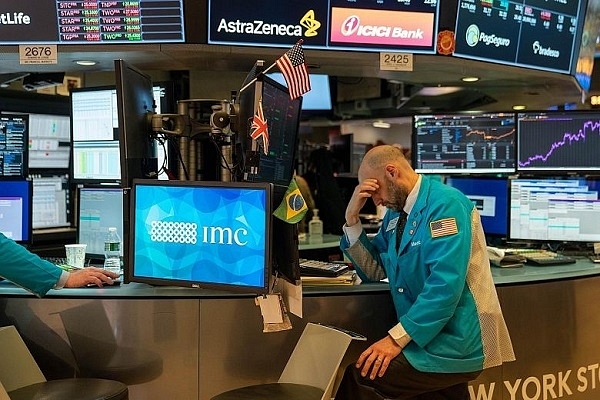Economy
Coronavirus Impact: As US Markets Sink, Fed Attempts A Trillion Dollar Rescue Plan
- Amongst the announcements, the Fed indicated that it will extend its purchases across a range of maturities and it will also buy Treasury Inflation-Protected Securities and also coupon-bearing securities, thus offering to infuse liquidity into the US market at a time when Coronavirus has tanked most indices.

With US markets tanking, the Fed has now stepped in.
On Thursday, the US markets witnessed a dramatic fall resulting in disruptions in the Treasury financing markets due to the coronavirus outbreak. Consequently, the Federal Reserve had to step in for the second consecutive day. It also happens to be its third such intervention in this week.
The carnage on Wall Street on Thursday could have played a role in ensuring adequate and timely policy action by the Fed. In totality, the series of announcements indicate an infusion of $1 trillion. However, markets weren’t impressed by the measures as the impact on stocks was only for a short duration.
Amongst the announcements, Fed indicated that it will extend its purchases across a range of maturities and it will also buy Treasury Inflation-Protected Securities and also coupon-bearing securities.
It will additionally offer $500 billion through the New York fed desk which will happen on a weekly basis for a three month and one-month repo operation while it will also offer an additional $175 billion in overnight repos and $45 billion for two-week operations.
In effect, the Fed is augmenting liquidity in the system through these measures with the intention of easing credit conditions and, perhaps, signalling to the markets that it is prepared to act to limit the economic impact of coronavirus.
The moves are over and above the 50 bps rate cuts announced by the fed earlier and comes with the backdrop of record low levels of US 10-year yields earlier this week.
The emerging consensus of a global recession has eroded confidence and has had a significant impact on the sentiment of market participants.
Despite the measures announced by the Fed, stock markets only got a temporary respite as market participants are sceptical as they recognise that monetary policy may not be the appropriate policy response.
Indeed, many have been calling for aggressive fiscal action in the US and there is a possibility of a payroll tax cut. There are additional concerns regarding whether the policy action in itself would be enough to calm the markets and in hindsight, we now know that, perhaps, a lot more is needed.
It is important to realise the three Cs that are at play here - Coronavirus, Confidence of Investors and Credibility of policymakers. The entire situation is due to a rapid outbreak of Covid-19 which has made the economic costs associated with the same clear to investors. This has brought in uncertainty regarding the future economic outlook as we still struggle to find a possible cure or a preventive vaccine for the same, which has eroded the confidence of investors.
Nobody knows when will this crisis end and whether we’re looking at a few weeks of disruption or whether this could extend to a few months.
This uncertainty in itself is responsible for why people are panicking, and it appears that this time people are withdrawing from assets with the intention of holding cash.
The third point is the most important, as any policy intervention would be effective only when it is credible, and investors believe that the policy is likely to address the core issue at hand.
It is precisely this reason why many prefer fiscal policy to be an appropriate intervention at the moment since it would be direct rather than just monetary policy.
In reality, both are needed as either of them may fail to be credible enough to calm the markets.
Indeed, markets wanted the Fed to act and its decision would have some impact on improving liquidity situation and ensuring that markets continue to function. However, even though the Fed emphasised that it would act aggressively as it is focussed on safeguarding market functioning, many questions whether it alone can mitigate the catastrophic disruption created by China.
It is precisely this reason why central bankers must swiftly go to their respective treasuries and get them to deploy whatever ammunition they have.
The job of the Fed at the moment must be hard as it is running out of monetary space and policy options at a time when it is dealing with one of the biggest economic and public health crises.
One can sympathise with them, but the responsibility, however, to calm the markets requires them to convince the Congress for a fiscal stimulus.
One hopes that the Fed too agrees and that this is the second thing on their agenda for the coming week!
Support Swarajya's 50 Ground Reports Project & Sponsor A Story
Every general election Swarajya does a 50 ground reports project.
Aimed only at serious readers and those who appreciate the nuances of political undercurrents, the project provides a sense of India's electoral landscape. As you know, these reports are produced after considerable investment of travel, time and effort on the ground.
This time too we've kicked off the project in style and have covered over 30 constituencies already. If you're someone who appreciates such work and have enjoyed our coverage please consider sponsoring a ground report for just Rs 2999 to Rs 19,999 - it goes a long way in helping us produce more quality reportage.
You can also back this project by becoming a subscriber for as little as Rs 999 - so do click on this links and choose a plan that suits you and back us.
Click below to contribute.
Latest